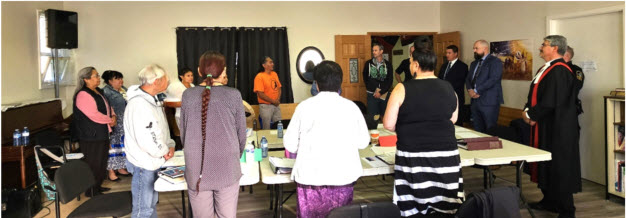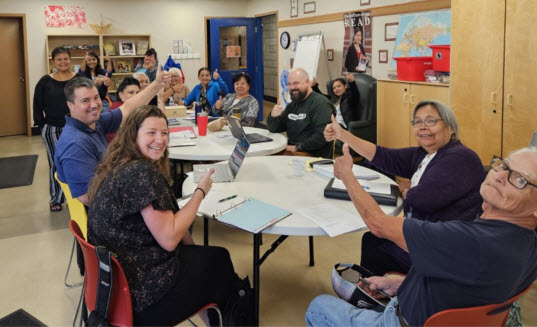The BC Provincial Court now operates nine Indigenous sentencing courts in communities around the province. How do these courts get established?
It takes dedicated people and a lot of work!
Kamloops lawyer Graham Kay has been on development committees for several Indigenous courts. He describes the 4-year process to develop BC’s ninth criminal Indigenous court in Lillooet.
“We started with smudging, welcoming remarks and Territorial Acknowledgment from Xaxli’p Chief Darrell Bob Sr., followed by drumming, singing, and an opening prayer. And so began the first sitting of the Lillooet Indigenous Court on September 15, 2023.

Elders, lawyers, support people, and Judge Raymond Phillips at the Court's first sitting
Getting started
It started as a vision of Matilda Brown, then the Addictions Worker with St’át’imc Health, who invited me to come to Lillooet to meet with community representatives about Indigenous courts, and what they would need to do to have one in their community. We held our first community meeting in November 2019. As the Lillooet court also covers the Lytton area, representatives from Lytton-area communities were invited to the table. Hence, the development of the court is led by people from the St’at’imc and Nlaka’pamux Nations.
Developing an Indigenous court is a complex process. It involves coordinating community members, Crown, Probation, Court Services, Sheriffs, judges (through the Judicial Case Manager), the Office of the Chief Judge, the Attorney General’s office, Legal Aid BC, the Law Foundation, RCMP, Tribal Police, community service agencies, local government representatives, and Band representatives. Just getting everyone together at the same time and in the same place is a challenge!
Forming a steering committee
In 2020 a Steering Committee was established to help guide the process. Thankfully, the Steering Committee was able to draw upon the experience of people experienced with Indigenous courts in BC, which made the process move more smoothly. Nevertheless, the Steering Committee had several tasks, including:
• drafting the Committee’s terms of reference
• establishing procedures to recruit and train court Elders
• establishing an Elders Council
• presenting information to band Councils, other governments and community groups
• obtaining letters of support
• working with community agencies that might provide ongoing staff support for the court
• obtaining funding through Legal Aid BC for a designated court Duty Counsel and honoraria for Elders
• obtaining funding from other sources, such as the Law Foundation of BC for an Elder and/or Court Navigator and court-related expenses
• working with Court Services and Sheriffs regarding appropriate venues, logistics and security
• developing a court business plan
• calling on Indigenous artists to design a logo for the Court
Creating a business plan
In 2016, the BC Ministry of Justice implemented a Specialized Courts Strategy that requires potential new specialized courts to submit a business plan to a Provincial Advisory Committee before government resources are allotted to a new court. The business plan is a comprehensive document covering such areas as:
• description, history and guiding principles of the communities in the area
• evidence of the need for an Indigenous court
• evidence of community support for the court
• evidence of support from the Crown, Court Services, and Probation
• descriptions of community resources available
• descriptions of the roles and responsibilities of the Steering Committee, Elders, and support staff (Navigators)
Business plans from other Indigenous courts provided a framework from which the Lillooet/Lytton–focused plan was developed. The Steering Committee secured funding to contract Kimberly Gee, a lawyer in the community who had worked on other Indigenous court business plans, to help write the proposal.
Getting prepared
Near the end of 2022, the business plan was presented to the Provincial Advisory Committee and approval to move ahead was received. In February 2023, members of the Steering Committee viewed several potential sites for the Court, as the Lillooet courthouse is too small to accommodate it. By unanimous agreement, the Better Living Center next to the courthouse was selected. In April 2023 the Committee had a second meeting with the Provincial Advisory Committee to ensure everything was on track.
Following the approval process, the Office of the Chief Judge informed us that the Court would sit every other month and that Judge Raymond Phillips, a member of the Lytton First Nation - Nlaka’pamux, would be assigned to the Court.
Committee members were tasked with Elder recruitment and training. There is a well-established orientation program for Indigenous court Elders in BC. Cliff Thorstenson, a Merritt lawyer and former Duty Counsel for the Nicola Valley Indigenous Court, has facilitated a three day orientation session in conjunction with the Nicola Valley Institute of Technology. Elders must also observe at least three sittings of other Indigenous courts and have a vulnerable sector criminal records check.
The St’at’imc and Nlaka’pamux Elders attended a final refresher course including a discussion of ethics about two weeks before the Court’s first sitting. Court Services staff, sheriffs and others participated to explain their roles in the court process and acquaint the Elders with the operational side of the court.
The Lillooet Indigenous court is the third Indigenous court in the Provincial Court’s Interior Region. This made implementation easier because Probation, Court Services, Sheriffs, Crown, and judges were already very experienced with Indigenous courts.
The new court’s Duty Counsel is Dustin Gagnon, a Kamloops Indigenous lawyer originally from Witset, BC who has represented many clients in Indigenous courts in Kamloops and Merritt. In addition, Roberta Moses, a Navigator for the Nicola Valley and Cknúcwentn First Nations Courts, will be working with the Elders for the next few months.
Not everything went as smoothly as this account suggests. In 2020, COVID delayed our work throughout the year. In 2021, the Village of Lytton was tragically destroyed by fire, creating further delays. Smaller fires in 2022 and 2023 also impacted the process.
Beginning Court sittings
However, on September 14, 2023 we had our first Elders’ Council pre-court meeting where we reviewed all of the cases to be heard in court the next day along with any reports that had been prepared. Last-minute questions were answered, and the Elders were reassured that they were ready! The Court’s first sitting on September 15 went without a hitch.
A formal Opening Ceremony is scheduled for March 13, 2024.”

Elders were ready for the first Court sitting
Provincial Court of BC Chief Judge Melissa Gillespie commented, “It takes a strong commitment and a huge amount of work to start an Indigenous court. The Provincial Court welcomes the Lillooet Indigenous Court as its ninth Indigenous court and congratulates everyone involved in its development.
The need for reconciliation with Indigenous peoples in an ongoing imperative for the Court. The Court’s collaboration with Indigenous and local communities to establish these specialized sentencing courts for criminal offences supports reconciliation and contributes to reducing over-representation of Indigenous peoples in the criminal justice system.”
More information
Indigenous Criminal Sentencing Courts
Indigenous Family Court

